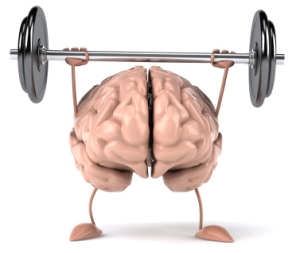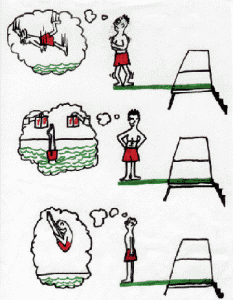You’re lying in bed. You’re meant to be at the gym, but you’re not. Yes, you’ve just substituted leg day for a pint of Ben and Jerry’s and a bottle of red wine day again – which by the way is a thing. The sweet, sweet taste of eating your weight in choc chip cookie dough ice cream is soon exceeded by the bitter taste of guilt – oh and red wine. The night is too old to make your metamorphosis from Honey Boo Boo to Beyonce, so maybe if you just think about exercising, then somehow this mesmerising, magical transformation will take place. Well guess what? It might just. Yes, researchers have recently been analysing whether thinking about exercising is as good as exercising itself. So what do the results say? Could thinking about working out be a substitute for actually working out? Maybe that’s how Beyonce’s been doing it all these years? Let’s find out, honorary scientists!
Muscle strength:
Question one: will thinking about exercise give you guns like Gerard Butler? A recent study tried to answer this question. Kind of. Said study had a group of people wear an immobilising arm cast for a period of four weeks. Half of this group were asked to think about contracting the wrist muscles as hard as possible (imagery), while the other group were instructed to do nothing. Amazingly, the group that imagined exercising the wrist were 50% stronger than the group that did nothing at the end of the study (1)! It was found that the imagery group had significantly greater activation of the area responsible for initiating this movement in the brain, suggesting that neurological processes were responsible for the increased strength, not so much changes within the muscle itself.
Another study compared imagining performing resistance exercises to no intervention. Over six weeks those that imagined performing a resistance exercise five days a week had 13.5% greater strength than those that didn’t imagine exercise (2). Two from two ain’t bad!
If that wasn’t enough science for you, here’s a bit more. In a further study, all participants underwent four weeks of weight training. Following this training they were split into: 1. a group who just performed resistance training in their head (imagery). 2. a group who did actual, physical resistance training and 3. a group who did nothing. Imagery and strength training led to greater improvements in strength than doing nothing, which we already knew. The biggest surprise though was that there was minimal difference in strength between the imagined and actual resistance training group (3). So where does this leave us?
Basically it indicates that thinking about performing resistance exercises causes the brain to work like it’s actually performing these exercises. Sadly this won’t directly make you “ripped”. Yes, you won’t actually get direct increases in muscle size, but rather improvements in the way the nervous system activates muscles – which is an important contributor to overall strength.
From a practical standpoint, imagery between physical sessions may then enhance the amount you’re able to lift in the gym, which could indirectly translate to actual improvements in muscle mass, function, looking like Michael Phelps. Furthermore, if you’re injured it’s a great way to keep the muscles active without, well, being active.
Sports performance:
So it looks like imagining exercising could make you stronger. But could it also make you better at sport?
Sports skills: When a group of volleyball players did normal training followed by PETTLEP, a specific way of visualising an exercise task, their performance of a passing task was significantly better than those that only did normal training (5). Don’t believe the science yet? Shame on you.
A group of tennis players were asked to play a match normally. Easy. Before their next match they were asked to think about serving well. Doing this led to a significantly higher number of first serves won and points won during their subsequent match (6). So, all in all, it looks pretty likely that imagery will aid in performance of sporting skills, which is likely to improve overall sports performance. The data is limited, but hell, it looks very promising.
Exercise performance: While thinking about performing a task improves specific sports skills, it’s unclear whether this will lead to direct changes in performance of non-ball sports such as running. A review paper analysed two studies assessing the effects of imagery on endurance exercise performance. One found a significant improvement in endurance exercise time, while another found no difference (4). A further study comparing the effects of exercise imagery before a cycle sprinting task to no imagery, found there to be no difference between the two groups (5). So, on the whole imagery may help non-ball sport performance, but it’s not entirely clear yet if it does.
Is it healthful?
It’s a question I’ve asked many times and as always I’d love to hear your opinion – unless of course it’s nonsensical criticism!
Muscle strength: Slightly healthful. It isn’t going to replace resistance training. But if you’re injured, miss a session, or are in the early stages of weight training (mostly neurological adaptations) it will help maintain/improve nervous system adaptations and therefore strength.
Sport skills: Moderately healthful. Thinking about how you are going to execute a sport skill has been demonstrated to improve performance during that sport. Many professionals, from many sports utilise this technique with good reason. Again, sadly, it doesn’t replace training.
Exercise performance: Unhealthful. At the moment, there’s minimal data that thinking about performing a non-ball skill based sport improves sport performance.
I hope this has been healthful!







Love this and yet another proven reason for me to be gym lazy lol
LikeLiked by 1 person
Haha I know, it’s a good excuse!
LikeLiked by 1 person
Good read! I do believe that visualizing success plays a significant role in achieving it. As my coach always tells me – “Visualize the win.” It really does help, in my experience. Doing so can almost make it seem as if you’ve been there before, taking the nervous edge off and increasing confidence so you can put in a solid performance. If only the gains obtained by visualizing were actually visible, we could all celebrate with a little Ben & Jerry’s and red wine. Which BTW sounds pretty good. 🙂
LikeLiked by 2 people
Haha thanks for the comment, Colleen. I know, I really wish they were!
LikeLike
Your brain is a powerhouse and you become what you imagine but the bigger question is can you take the beast called BRAIN??? 🙂
LikeLiked by 3 people
So. True. The hardest organ to tame, in my opinion.
LikeLiked by 1 person
🙂
LikeLike
I agree with Bilal… If I go into a ride with doubt, I’m virtually guaranteed a struggle. That same ride, done with confidence, I’ll be the guy off the front, wondering how I got so strong. The studies you cite show this. Thinking about exercise, Ben and Jerry’s and wine will get you mentally prepared to be strong, fat and drunk. Visualizing strength durning exercise and then doing the exercise will make one fast. Interesting post… I’ll have to visualize kicking everyone’s butt more often!
LikeLiked by 2 people
Haha spot on! Expecting to hear about some good times in the near future.
LikeLiked by 1 person
Reblogged this on peakmemory and commented:
“thinking about performing resistance exercises causes the brain to work like it’s actually performing these exercises”
LikeLiked by 1 person
Love to read the post..
LikeLiked by 1 person
Thank you too much
LikeLike
This is a great post. Something I never ever considered. However…. I think about cake a lot so is that why I have put on 2kg?!?
LikeLiked by 1 person
Haha yep, that’s definitely the reason!
LikeLiked by 1 person
You made me think whether playing golf is a good exercise… There’s a lot of walking and it is a mental game. 🙂
LikeLiked by 1 person
Absolutely. And thinking about golf, will likely improve your golf!
LikeLiked by 1 person
Wow! Thanks for the great tip! 🙂
LikeLiked by 1 person
Reblogged this on Is it healthful?.
LikeLike
I sure hope thinking is as good 😉
LikeLiked by 1 person
Me too!
LikeLike
A great read! Our mind is powerful and we can use that to be our best. That’s the concent I use at shredwithshah.com when i train individuals.
LikeLiked by 1 person
Thanks, Shah. Well said!
LikeLike